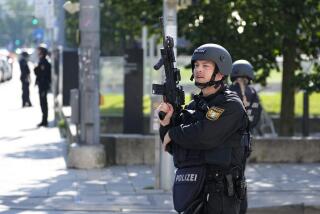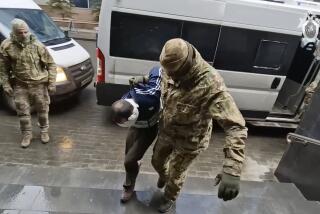Macedonians Say 7 Terrorists Killed in Clash
- Share via
SARAJEVO, Bosnia-Herzegovina — Police in Macedonia killed seven foreign terrorists Saturday who were planning attacks on embassies and other targets, Macedonian Interior Minister Ljube Boskovski said. The dead men were apparently Pakistanis, authorities said.
“They planned attacks on important buildings [and] foreign diplomats, most probably from the U.S., Germany and the U.K.--those that were involved in the fight against global terrorism,” Boskovski told reporters in Skopje, the Macedonian capital. Macedonian Interior Ministry officials portrayed the incident as providing the first clear evidence of ties between ethnic Albanian guerrillas in Macedonia and the Al Qaeda terrorist network.
An armored personnel carrier and about 15 heavily armed Macedonian police officers were stationed outside the U.S. Embassy in Skopje on Saturday. Security had also been beefed up at the German and British embassies.
The fighters killed in a shootout were believed to have been linked to four foreign “moujahedeen” arrested in Skopje nearly two weeks ago--two Jordanians and two Bosnians who had studied in Jordan--a senior Interior Ministry official told reporters on condition he not be identified.
Computer disks seized with that group contained 10,000 pages of documents, some of which showed evidence of planning for terrorist attacks in the region, police said.
Five ethnic Albanians arrested last week also were believed to be linked to those killed Saturday and the four arrested earlier, the senior official said.
Saturday’s clash erupted when police near Butel, a suburb of Skopje, noticed a suspicious vehicle and were fired on when they approached it, the official said. The police returned fire, and the seven alleged terrorists were killed as they attempted to flee, he said.
Macedonian state television showed the police vehicle, one of its windows shattered, riddled with bullet holes. The station also showed the bodies of the men killed in the shootout, who appeared to be from South Asia. No police were killed or wounded, authorities said.
Other footage showed a dirt road between two vineyards, with bloodstains on the ground.
The government in Skopje, which is dominated by ethnic Macedonians, has been under severe international pressure to make political concessions to the country’s large ethnic Albanian minority. Conflict between government forces and ethnic Albanian guerrillas of the National Liberation Army brought Macedonia to the brink of civil war last year.
The guerrillas claimed to be seeking greater rights for ethnic Albanians within Macedonia, while the government charged that they were trying to break off ethnic Albanian parts of the country and attach them to a “Greater Albania” or “Greater Kosovo,” the largely ethnic Albanian province of neighboring Yugoslavia.
An August peace deal helped calm the situation, but political reforms called for under that agreement have stalled. There are widespread fears that splinter rebel groups are planning a renewed insurgency, based either on genuine anger at the slow pace of reforms or on using the lack of greater political progress as a pretext to renew a separatist agenda.
Saturday’s incident was the worst violence in the country since the guerrillas officially disbanded and turned over about 4,000 weapons to the North Atlantic Treaty Organization under a disarmament plan that was part of the peace deal.
Also as part of the peace agreement, police have been cautiously moving back into villages that had been guerrilla-controlled. However, an estimated 60 to 80 villages remain without a police presence--in effect, outside government control.
The Macedonian government charged last year that guerrilla forces had used Kosovo as a staging area for attacks. Although it is a province of Serbia, the main republic in Yugoslavia, Kosovo has been under U.N. administration and patrolled by a NATO-led peacekeeping force since mid-1999.
Boskovski, in an apparent effort to strengthen the impression that the men killed Saturday were linked to ethnic Albanian guerrillas, said that the men had “arrived from the direction of the northern border,” which would mean Kosovo.
“They were headed toward Skopje,” he said.
Boskovski said he did not believe that Saturday’s incident heralded the start of a widely feared “spring offensive” by ethnic Albanian guerrillas.
“However, our security forces remain ready to react, if need be, to any type of challenge,” he said.
Seven AK-47 assault rifles, ammunition and several grenades were found at the site of the shootout, police said in a written statement. Uniforms with shoulder patches of the officially disbanded guerrilla army also were found, it said. An Interior Ministry official cited the uniforms as further evidence of links to ethnic Albanian rebels.
Government officials have charged that the National Liberation Army has only pretended to disband and disarm and that in reality it is still ready to fight.
Macedonia has been relatively calm for the last several months. Some observers have attributed this in part to a pending European Union-sponsored conference of aid donors, tentatively scheduled for March 12 in Brussels, at which the country hopes to receive pledges of $200 million in aid. Neither side wants to be blamed if pledges are cut or the conference is postponed because of an upsurge in fighting.
More to Read
Sign up for Essential California
The most important California stories and recommendations in your inbox every morning.
You may occasionally receive promotional content from the Los Angeles Times.













